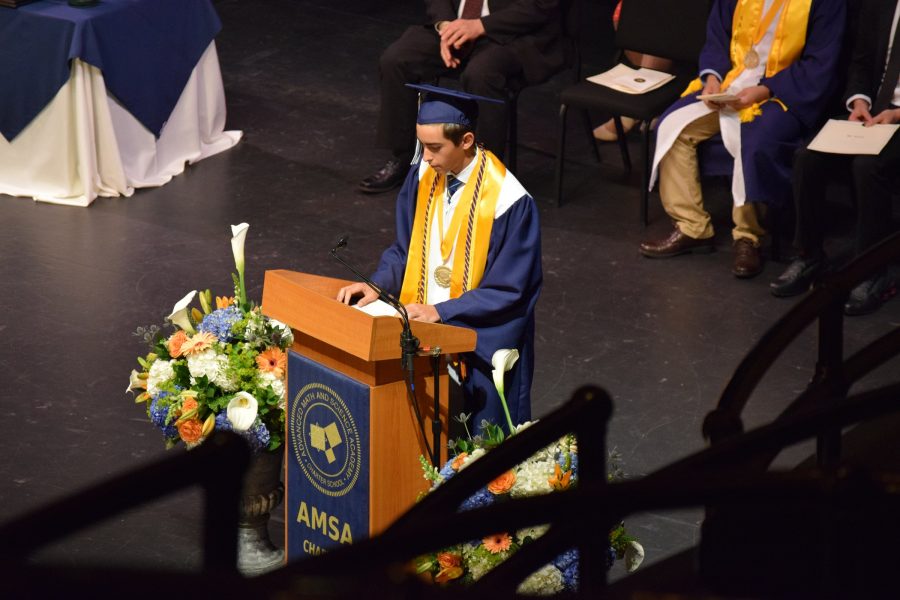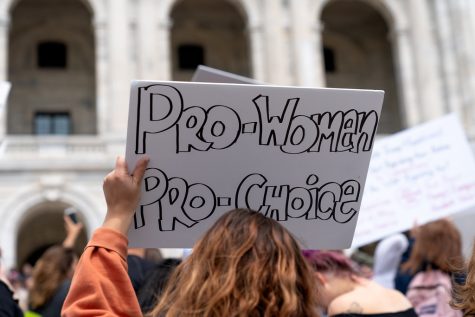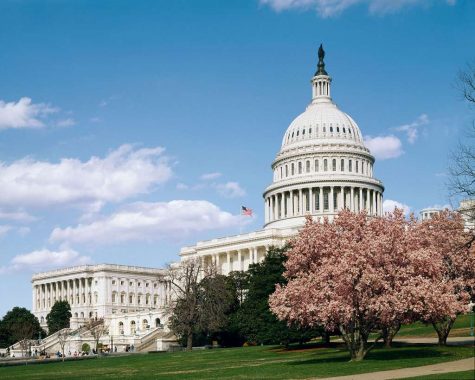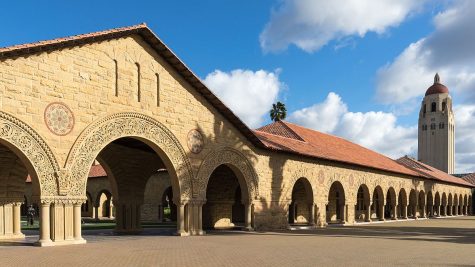Banning students from ceremony was the right decision
EDITORIAL
Valedictorian Anton Zverev giving his address at commencement ceremonies on Sunday.
On May 24, a large number of AMSA seniors attended a house party to celebrate their last day of high school. The community now knows that events took place at this party that caused four seniors to be banned from participating in Sunday’s graduation ceremony.
Was it the right decision?
Consider that video surfaced from the party showing underage students drinking and “chanting seriously insulting and defamatory epithets” about a fellow student, according to a letter sent out by Executive Director Dr. Joseph McCleary.
The videos were distributed mostly through Snapchat stories, where anyone who is friends with the poster can watch the video as many times as they want for a period of 24 hours after it is posted.
The administration’s decision is completely justified, no matter how controversial. What these students failed to realize is that until they graduate, they are still representatives of AMSA and can still receive consequences for actions that are not only harmful, but illegal.
Just because they are not in class anymore does not mean that they can’t be held accountable. How these students behave outside the classroom reflects back onto the school itself.
As of 2010, AMSA designed a Bullying Prevention and Intervention Plan that clearly states and explains the school’s role in intervening in the case of bullying, be it physical or electronic.
It states that the “Principal or designee will determine what remedial action is required, if any, and determine what responsive action and/or disciplinary action is necessary,” including preventing students from walking at graduation.
In addition to the Bullying Prevention and Intervention Plan, the Student and Parent Handbook that is available on the school website states that “abusive language that threatens, embarrasses, defames or intimidates another person will cause the offender to be subject to disciplinary action.”
Considering the fact that every student and his or her parent has to sign off on a form saying that they have read and agree to follow the rules stated in the handbook at the beginning of the year, these students should not be surprised to have action taken against them.
To reinforce the policy on bullying and potential consequences, administrators are currently in the process of planning a meeting with the rest of AMSA’s high school classes.
Dr. McCleary, in a letter emailed to the AMSA community on May 28, wrote that the “administrative team will be meeting with the three high school classes to discuss bullying and reiterate AMSA’s expectations for student conduct.”
Since the seniors were already out of school, there was nothing else administration could really do to punish them.
At least one student was verbally attacked and targeted at an event they did not attend. They had no way of defending themselves. School officials had every right to intervene the way they did.
In a second letter to the community distributed via email by Dr. McCleary on Saturday, he wrote that “some of you may have heard that the host of the party denied any wrongdoing, despite conclusive evidence to the contrary. The parents brought the case to court in an attempt to obtain an injunction against AMSA.”
The parents, Vince and Moleeka Calandra, told The MetroWest Daily News that the school had overreached in its authority. The school, however, has every right to reprimand students for illegal activities done outside of school, especially if it in any way harms another student.
Worcester Superior Court Judge Shannon Frison agreed on June 3, denying an injunction sought by the Calandras.
AMSA does not condone underage drinking or bullying in any form, and it would reflect poorly on the school if action had not been taken against the students who engaged in this behavior.
Walking across the stage to be honored at graduation is a privilege, not a right, and by breaking the law the school rightfully decided to take this privilege away from them.

Coretta is a senior and is in her second year writing for The AMSA Voice. Last year she served as the photo editor, and this year finds her as co-editor,...

Nick Sousa is a member of the class of 2017. In school, he excels in computer science. Looking forward, he sees himself studying in the field of computer...













bro • Jun 11, 2016 at 10:30 am
This article is just wrong. The writers do not know wat they are talking about. “At least one student was verbally attacked and targeted at an event they did not attend. They had no way of defending themselves.” is a 100% false statement as adminstration made that up as they thought the students were chanting something that they were not. Were the writers there? No.
bro2 • Jun 11, 2016 at 2:26 pm
I was at that party and I agree with the reparations for my friends. They were bullying kids in their grade and bullying should never be tolerated. We all saw the snapchats and it’s not even a question that they were bullying people. Yes, I was at that party, and yes, I agree with the actions AMSA took against the bulliers.